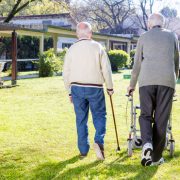Spring Activity Ideas for Residents in Fallbrook Assisted Living
Spring is the season of new beginnings when the warmth of sunshine touches your skin after months of cold and darkness. It is also when the flowers bloom, and their scent fills the air. In Fallbrook Assisted Living, spring is an opportunity to lift the residents’ feelings, reawaken their creativity, foster social connections, appreciate nature’s beauty, and use their energy in fun activities and making wonderful memories. Above all, springtime enriches residents’ lives and lightens the facility’s mood.
Spring & Mental Health in Fallbrook Assisted Living
As spring blooms repaint the world, the season also promises rebirth, allowing residents to rejuvenate and take good care of their mental health. Spring is not just about the beautiful outside world; it also brings fresh air and renewal for everyone.
The warmth of sunshine and longer daylight hours are proven to impact mood positively. The warmer temperatures allow residents to soak up the sun and enjoy outdoor activities. Sun exposure is a natural source of Vitamin D, responsible for regulating mood because of the release of the feel-good hormone.
In Fallbrook Assisted Living, residents can take a leisurely walk outside and picnic with family or friends, fostering a sense of connection with nature and the people dear to them.
The longer daylight hours are also perfect for rediscovering their love for arts and creations. A simple coloring or shading activity lets one forget the world and let time fly. Or do gardening activities to reduce stress and anxiety. Gardening also develops the focus and being in the moment. Additionally, seeing the plants grow gives seniors a sense of accomplishment.
Spring is also an opportunity to organize social activities and programs for residents to create meaningful connections. With newfound and for keeping friends, residents can now share stories and experiences that are good for cognitive function, memory retention, emotional support, and a sense of purpose.
Let us embrace and celebrate the joy of Spring through creativity, camaraderie, and connections to uplift spirits and mental health.
Spring Activities for Fallbrook Assisted Living Residents
Take advantage of the warmth of new beginnings through spring activities beneficial for physical and mental health. Here are a few activities you can try at Fallbrook Assisted Living:
Bird-Watching
Assisted living communities can organize bird-watching activities for fun and education. One study revealed that birth-watching can lower signs of anxiety and depression.
Farmers Market
Get some sunshine, find fresh produce, and watch people.
Flower Arranging Lessons
Organize a flower-arranging workshop for residents to learn the art, express themselves artistically, or express difficult-to-convey emotions.
Gardening and Garden Tours
Organize gardening activities where residents can plant flowers, herbs, or vegetables and feel accomplished as they watch them grow. This physical activity is also a good way to keep them active.
Go on botanical tours to nearby gardens with residents and their families to learn about different plant species and appreciate spring blooms.
Picnics and Walks in Fallbrook Assisted Living
Go on guided walks with family or friends to enjoy the sun and the scent of spring. Enjoy the fresh air, the sunshine, and the dear company of people you love.
These are just suggestions. Feel free to improvise according to your residents’ preferences.
Looking for excellent care and community in Nebraska? Click here to learn more about Fallbrook Assisted Living!
Fallbrook Assisted Living is proud to offer its services to Fremont, NE, and surrounding areas and cities: Arlington, Cedar Bluffs, Ames Nickerson, Fontanelle, Arlington, Leshara, Colon, and Hooper











